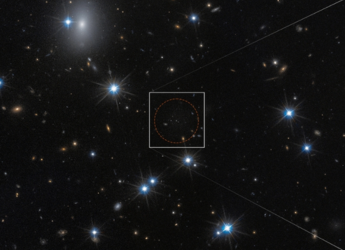- Home
- Science
- Science News
- NASA to Send Squid, Water Bears to Space Station for Experiments: All You Need to Know
NASA to Send Squid, Water Bears to Space Station for Experiments: All You Need to Know
NASA said water bears and the squid are model organisms for studying biological survival under extreme conditions.

Photo Credit: Jamie S. Foster, University of Florida/NASA
These immature bobtail squid (Euprymna scolopes) are part of the UMAMI investigation
NASA is going to take squid into space in a mission that may remind you of the hit HBO series Watchmen. The space agency has decided to send 5,000 tardigrades or water bears, and 128 baby glow-in-the-dark bobtail squid to the International Space Station (ISS) this month to conduct research. They are part of the cargo that SpaceX will launch aboard its Falcon 9 rocket. Researchers want to understand how water bears tolerate the stressful environment in space, and whether the lack of gravity affects symbiotic relationships — mutually dependent co-existence — between the squid and beneficial microbes.
In one of the episodes, Watchmen (Review) explores what life would look like under an alien squid attack. In a statement, NASA said water bears, tiny creatures that tolerate environments more extreme than most life forms can, are a model organism for studying biological survival under extreme conditions. The results could help better understand the stress factors affecting humans in space.
The ISS has been in space since 1998. Essentially a large spacecraft and floating laboratory, it allows astronauts to stay in space for weeks or months to carry out experiments in microgravity.
“One of the things we are really keen to do is understand how tardigrades are surviving and reproducing in these environments and whether we can learn anything about the tricks that they are using and adapt them to safeguard astronauts,” said principal investigator Thomas Boothby.
Animals, including humans, rely on microbes to maintain a healthy digestive and immune system, but it's not clear how a space flight affects these beneficial interactions. The experiments with squid will help scientists understand whether space alters the symbiotic relationship between the squid and the bacterium Vibrio fischeri. This will be done as part of the UMAMI experiment, which stands for Understanding Microgravity on Animal Microbe Interactions.
The Falcon 9 rocket will lift off for the 22nd refuelling cargo mission from Kennedy Space Center in Florida on June 3. The SpaceX resupply mission will also carry new solar panels that will be installed outside the space station by astronauts during a space walk. Other experiments heading to the ISS include a portable ultrasound and analyzing how kidney stones form in space.
Get your daily dose of tech news, reviews, and insights, in under 80 characters on Gadgets 360 Turbo. Connect with fellow tech lovers on our Forum. Follow us on X, Facebook, WhatsApp, Threads and Google News for instant updates. Catch all the action on our YouTube channel.
Related Stories
- Samsung Galaxy Unpacked 2026
- iPhone 17 Pro Max
- ChatGPT
- iOS 26
- Laptop Under 50000
- Smartwatch Under 10000
- Apple Vision Pro
- Oneplus 12
- OnePlus Nord CE 3 Lite 5G
- iPhone 13
- Xiaomi 14 Pro
- Oppo Find N3
- Tecno Spark Go (2023)
- Realme V30
- Best Phones Under 25000
- Samsung Galaxy S24 Series
- Cryptocurrency
- iQoo 12
- Samsung Galaxy S24 Ultra
- Giottus
- Samsung Galaxy Z Flip 5
- Apple 'Scary Fast'
- Housefull 5
- GoPro Hero 12 Black Review
- Invincible Season 2
- JioGlass
- HD Ready TV
- Latest Mobile Phones
- Compare Phones
- Realme P4 Lite
- Vivo V70
- Vivo V70 Elite
- Google Pixel 10a
- Tecno Camon 50
- Tecno Camon 50 Pro
- Lava Bold N2
- Vivo V60 Lite 4G
- Asus Vivobook 16 (M1605NAQ)
- Asus Vivobook 15 (2026)
- Infinix Xpad 30E
- Brave Ark 2-in-1
- Amazfit T-Rex Ultra 2
- boAt Chrome Iris
- Xiaomi QLED TV X Pro 75
- Haier H5E Series
- Asus ROG Ally
- Nintendo Switch Lite
- Haier 1.6 Ton 5 Star Inverter Split AC (HSU19G-MZAID5BN-INV)
- Haier 1.6 Ton 5 Star Inverter Split AC (HSU19G-MZAIM5BN-INV)







![[Partner Content] OPPO Reno15 Series: AI Portrait Camera, Popout and First Compact Reno](https://www.gadgets360.com/static/mobile/images/spacer.png)








